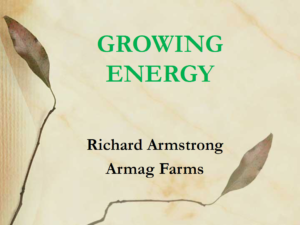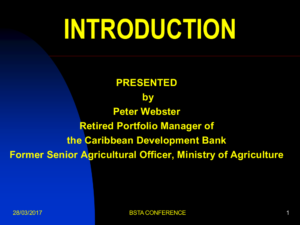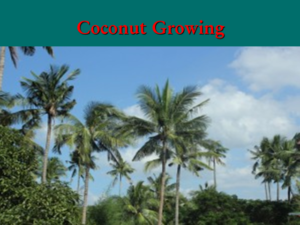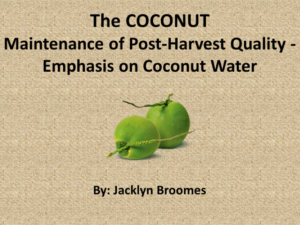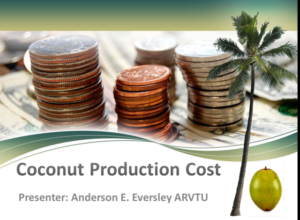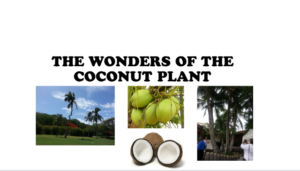I was amused by the recent comments of a World Bank economist reported in the news on Friday 25, January, 2008 that “It may be better for small states such as the developing countries of the Caribbean to de-emphasise agricultural production, import food and focus their attention on reducing poverty”. These comments were nothing new as some of our regional economists have been saying the same misguided thing for years, but they reminded me of former USA President Ronald Reagan’s description of economists as “People who see something actually working in reality and still question whether it would work in theory”.
The developed countries of Europe and North America have subsidised their agriculture for over a hundred years. Such direct subsidies currently amount to the equivalent of almost a trillion United States Dollars annually in the countries of the European Union, and the United States of America is not far behind. At the same time they also provide market protection for their producers. Why? Subsidies keep their farmers gainfully employed on their land, promote food security, minimize food costs and contribute substantially to their country’s economy which is not drained by the cost of importing all of their food. Research has also shown that every dollar spent in agriculture is recycled, on average, six times in the economy which is more than that occurring in any other sector. The high multiplier effect of agriculture in an economy results from the fact that food is a necessity for everybody and agriculture largely involves the rural poor who may be described as the base of the economy. It also results from the value added component of agro-industry that would not exist in the absence of agriculture.
Agricultural production subsidies, especially for local markets, cannot be faulted whether in developed or developing countries. Similar subsidies are now an accepted norm in many other sectors including education, health, housing, water, et al. Why not agriculture (food production)? The problems come with the surpluses the subsidies tend to produce and the implication that countries producing such surpluses are more efficient producers than anybody else – a myth. However, when these surpluses are dumped on the world market at half of the actual cost of their production, the destructive effect on farmers in countries without such subsidies or market protection is worse than any terrorist bomb. This helps to explain why there are mountains of food in storage in some countries while millions are starving in others.
The continent of Africa was a net exporter of food up to the time (1960s) that economists started telling the new popular leaders of emerging African Nations the same nonsense quoted in the opening paragraph. They imported cheap, subsidised food for their masses at the expense of their local farmers who then added to their countries’ problems by vacating their farms and moving to the nearest urban areas in search of jobs. In so doing, the African countries were drained of scarce foreign exchange – the imported food may be cheap but it still costs foreign exchange – and they were also saddled with the attendant problems of increased rural poverty and servicing the urban spread. Africa, once a “bread basket” for the world, now has starving millions, imports more than half of its food and is mired in debt and poverty despite a wealth of human and natural resources.
The exceptions to the foregoing, South Africa and Zimbabwe, support the argument that the African countries’ agricultural decline was a major cause of their economic problems and not just poor leadership and corruption as popularly thought i.e. before Robert Mugabe destroyed his country’s farming community. Please note that the foregoing has been documented by many researchers.
A related issue is that the farm gate price of food is seldom more than 50% of the market price. Handling, transport, packaging, storage, distribution and marketing of food can account for 80% of the market price. This value added is seldom recognized by commentators discussing food prices when they target production costs.
All of this at a time when the United Nations has been promoting the concept that if you “give a man a fish you may feed him for a day but if you teach him how to fish you feed him for a life time”. In other words if you “give a man food you may feed him for a day but if you help him to feed himself you feed him for a lifetime”.
When questioned as to “why they think that the developed countries can justify their heavy agricultural subsidies but the developing countries cannot”? Economists have responded simply that the developed countries can afford it but the developing countries cannot. There can be no doubt why the developed countries can afford the subsidies while developing countries cannot and are unlikely ever to be able to afford it. One builds while the other bleeds.
Can developing countries (large or small) afford not to subsidise their own food production? The answer lies in how we classify the sector. Is it productive or social? It is understandable why there is a difficulty in justifying subsidies of activities in the productive sector, including export crops, but food production and related food costs are so closely associated with the social sector and poverty that the classification and justification is de facto. Besides, the reported comments can only apply where there is full employment in more productive activities than food production and this has not yet happened in any country – developed or developing, large or small.
Peter Webster
Note: Peter Webster is a retired Portfolio Manager of the Caribbean Development Bank and a former Senior Agricultural Officer in the Ministry of Agriculture.

